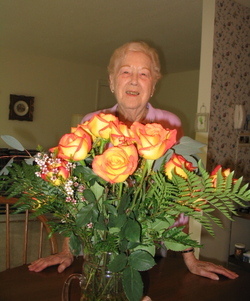 Shloshim is the number 30 in Hebrew, and this past Tuesday morning, immediately following Shacharit, the morning prayers, marked 30 days since my mother Elsie's burial. I have been going to synagogue daily to davven and to say Kaddish for her. When the moment arrives to stand and remember, the service leader asks everyone to share the name of the person whom s/he is saying Kaddish for. I say, "My mother, Elsie Novak, Osnat bat Moshe Bayer haCohen v'Nachuma." The mourners and those observing yahrtzeit proceed to say the words together, the text of the Jewish mantra which dating back to the 1st C BCE, words which serve to sanctify all life, as we gently guide the soul of our loved ones back to their source. While saying Kaddish last night I began to cry. The tears came not from immediacy of my mother's death, that has subsided with time, but rather from a fear that after only 30 days the recitation of the Kaddish was already feeling somewhat rote, routine, and G!d forbid, mundane. I don't want my remembering to become distracted habit, I want it to stay fresh and vibrant and heart-opening. How had 30 days had passed so quickly? The truth of that saddened me. The text of the Kaddish is engraved in me. I do not need to read it from the siddur. יהא שמה רבא מברך... With my hands free my mind began to wander. I heard the echo of a word that my mother used to use: PLICHING When it was raining very, very hard, my mother would say that "it's pliching out." I never had had any impulse to research the origin of the word, but during shiva, when many things have time to surface, I took the opportunity to pick up my English-Yiddish dictionary, and sure enough, there it was: פליוכרעגן (someone please help me with the pronunciation here). I smiled, and acknowledged that it had taken me all of my life to look up the word that my mother used so often. Why had it taken until now? More tears welled up. The Kaddish continued, לעלא מן כל ברכתא ושירתא Another word arose in my consciousness, KAMMONDAVING. My mom used this word to mean making a racket, or commotion, as in "Who needs all that kammondaving around the house." I was less successful finding any origin of this word in the dictionary. Perhaps my mother had made it up? The sense of the word did play a role before shiva started. I had decided that although I would let my various communities know of my loss, I was not going to advertise the times that we would be sitting shiva. I don't like the vibe after prayer, which more often than not turns into a loud social gathering as opposed to being in a house of mourning. I questioned my decision not to make the times public, but at one point realized, "That's my mother! She wouldn't have liked all the kammondaving in the house." Another way that my mother lives on through me. I have 10 months left to say Kaddish for my mom. The ritual will take me through the winter, spring, summer, and fall; through the entire year's cycle of holidays; through planting and tending and reaping and finally again laying to rest my beloved garden; through watching the budding of our lilac tree, until it flowers, when I will bend a branch to my nose, a havdalah moment, and I will gather in my mother's favorite fragrance. I will then say out loud, "Hello Mamale"; through another baseball season where every batter's intention is to circle the bases and return home. עשה שלום במרומיו הוא יעשה שלום... I wipe the tears from my eyes, and a sense of peace comes over me. Death, burial, shiva, shloshim; minyan, kaddish, breathe. אמן Amen  Minyan Oneg Shabbat has been offered a Matching Grant up to $1500. As of 12/11 only $418 more to raise by 12/31! Please consider offering a tax deductible donation of $18 or more to support this project and the work of DC's Jewish Renewal community Minyan Oneg Shabbat. All proceeds go to providing us with rental space and the ability to dream a little bigger.
1 Comment
 I am always delighted when someone reacts to something that I have said with "I never knew that!" Sometimes my reaction includes a mix of astonishment and dismay. The astonishment comes from having the immediate thought, "Really? I thought everyone knew that", and the dismay from "How could that be? What a loss that you never knew that." For example, during the Minyan Oneg Shabbat study session on Leil Tikkun Shavuot (yes, it has been a while since my last post), I quoted this passage from the Talmud: "In the world to come, each of us will be called to account for all the things G!d put on earth which we refused to enjoy." This elicited an immediate response: "It says what? That we're supposed to enjoy all that life has to offer. That's Jewish? I never knew that!" The woman shared with me in private that she thought that Jews are supposed to suffer and to do without. I was both astonished and saddened that something as definingly Jewish had never been communicated to her, and if it had, she had not been able to integrate that truth into her life. Here's another example. Last week I gave a drash during which I talked about my love for gardening, and specifically talked about composting. I shared this lovely passage from Rabbi Balfour Brickner's (z"l) book Finding G!d in the Garden: "...there always seemed to be a lot of garbage. What to do with it? For years we did what most people do: we threw it out...(into) a garbage can...electric disposal. Frankly I never gave the matter a second thought. That was what one did with garbage. It was only when I began to garden that my postculinary habits changed radically. Garbage...took on new meaning for me - and new life. In fact, that is exactly what happens to it when it is used in the garden: it takes on new life. Put differently and much more to the point, what seems dead lives - again." After quoting this passage I punctuated it by saying "Mechayei HaMaytim, the One who restores life to the dead." After services a woman thanked me, saying "I've never been offered a metaphor for the phrase "Mechayei HaMeytim" that worked for me. Thank you." Mechayei HaMeytim" - the quality of the Divine as the One who restores life. Wait a moment, this woman had fifty years of Hebrew school, synagogue going, study sessions, and book reading and it wasn't until a few sentences about composting that she gained insight into this seminal and theologically difficult phrase? I felt blessed to have been the messenger - and astonished and dismayed. Astonished at the reminder that some of us chant words which we have no understanding or relationship to. And dismayed that we, and I certainly include myself, go through so many daily rituals without introspection or reflection. That is something that I did know. It's what to do about it that is the constant challenge. |
Mark Novak is a "free-range" rabbi who lives in Washington DC and works, well, just about everywhere. In 2012 he founded Minyan Oneg Shabbat, home to MOSH (Minyan Oneg Shabbat), MindfulMOSH (Jewish mindfulness gathering), and Archives
June 2017
Categories
All
|
 RSS Feed
RSS Feed
